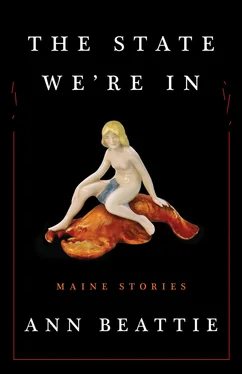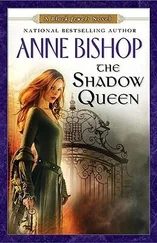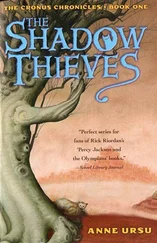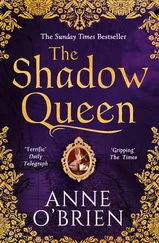“I suppose that’s it, in a nutshell. Other famous people, of course. America loves celebrity.”
“Any small anecdote I might have about Capote isn’t likely to justify your investment of time.”
“At least you know who he is! When I reeled off some names to Hannah, she’d hardly heard of anybody — even though quite a few lived in Maine. She’d heard the name Truman Capote and she thought he wrote Christmas stories for children! She’d never heard of Diane Arbus, she’d never heard of Elizabeth Bishop. She’d heard of Robert Lowell, though she’s never read anything by him. I suppose he isn’t taught in school anymore.”
“Cal — Lowell — was so much older than we were, but he was very kind to Dem. He wrote a letter that got him a Guggenheim when we badly needed money. That poem Elizabeth Bishop wrote after his death is one of the saddest things I’ve ever read. Will Lowell be in your book? Because of his negative effect on almost everyone?”
“Not on Bishop. They loved each other.”
“That’s true. So he’s exempt?”
“Yes.”
“You’re serious? Being in love with one person is all it takes to get off the shit list?”
“I never considered including him. Phil Spector is in the book.”
“I don’t know who that is.”
“Wall of Sound?”
“I’m afraid I have to let you down, just like Hannah.”
“Not at all! It’s very nice of you to make time for me. Please, let me take you to lunch. Hannah won’t… she won’t spring out from behind a bush, or anything. You know how they are. They want to be off by themselves to text and listen to their music and reapply all that makeup that doesn’t look like makeup, and then they’re exasperated if you suggest they put on some lipstick and comb their hair.”
Clair got up and lifted her key ring from the nail by the door. She’d never changed the key ring; it was still the clunky little geode dangling from the end of a brass chain Dem had always carried, saying he’d gotten it from the Lilliputians, who swung it to knock out their Lilliputian enemies. Enemies. What a concept. Something people emphasized during wartime. Or that they still might call political opponents or predators in the animal kingdom. Down the street, the lawn service was unloading a riding mower. The violets would go under, and the dandelions with them. The service had pulled up where Adver’s ex-wife lived — the woman he still sometimes dropped by to see after he made repairs. Those times he wasn’t too hungover to make the repairs he’d promised to make. (“Just turn off the valve. I’ll be there early Tuesday.”)
“So you knew Lowell,” Terry said. “I envy you that. Did you ever meet Elizabeth Hardwick?”
“I did. At a dinner in New York. I sat next to her and we talked about Trollope. Or she talked about him and I listened.”
“That was one classy lady.”
“She was. She had very curly hair and it kept blowing all through dinner, though there wasn’t a fan anywhere. It just blew.”
“How do you account for that?”
“Maybe her ideas, disturbing the currents of the air?”
“You’re quite funny. I’m sure people tell you that.”
“At my age, friends don’t pronounce on other friends any longer, and no one new I meet ever takes the slightest notice of me.”
“Do you miss Virginia?”
“Particularly in April, when spring doesn’t come here, and doesn’t come.”
“Blackflies do,” he said.
“That’s right. What about you? Do you miss it?”
She realized, now that the talk had turned banal, that earlier they’d been having a little flirtation. To no end, but they’d had an amusing volley. She touched her hair. She rubbed the tip of her nose, delicately. It never helped to scratch the itch in allergy season.
“I try not to miss places, because they’re all so different now. Maybe not the heart of Williamsburg, but that’s a sort of Disneyland, isn’t it? Everything else changes.”
“You’re too young to think that way. You’re supposed to see it as progress. Or not to notice at all.”
“I’m a writer. I have to notice.”
The waiter introduced himself. Michael was six feet tall, with blazing blue eyes. He recited the specials like a choirboy sight-reading complicated music for the first time. His eyes locked on the nothingness of the middle distance as he spoke. When he walked away in his white shirt and black pants, Clair saw that he was wearing yellow sneakers without laces. Had Terry, with the imperative to notice things, noticed that? They both ordered coffee.
Clair said, “I’ll tell you my one Truman Capote story and get it over with, then you must tell me something you’ve discovered writing your new book. What you know will be far more interesting than anything I have to say, but here goes: I was friends with one of Johnny Carson’s ex-wives, Joanne. She took a road trip with Capote to visit her sister, who lived just outside Charlottesville, but her sister suddenly came down with what turned out to be mumps so they ended up staying with me for a night. Dem wasn’t famous then. He and I were housesitting for some university couple who’d gone to Spain, taking care of their garden and feeding their cat. I cooked a chicken and made a salad. I wasn’t going to a lot of trouble just because the famous Truman Capote was coming to dinner. He’d like me or he wouldn’t. Dem always said one of the things that attracted him to me was my self-assurance. Anyway, to my surprise, he was rather shy. He kept calling some friend named Leo on the telephone and leaving dollar bills ‘for the phone bill.’ Maybe ten dollars. When he was leaving, he reminded me that the money was by the phone and said that if I wanted, he’d sign his name on the bills. Can you imagine? Sometimes people say things like that to test you: how impressed are you that they’ve been in your house? Did I say Dem was away on an assignment? I said something like ‘Do whatever you think best,’ and he hesitated, then walked back to the kitchen. We stood there while he autographed dollar bills. Joanne was rolling her eyes, but she adored him. She thought everything he did was amusing. After they left, I saw that all the signatures were different. They all said Truman Capote, but some of the writing was slanted backward, and some of it looked like calligraphy, and in one the T had curlicues at the top like ram’s ears. If I still had them, I might be able to list them on eBay. He also guessed almost to the penny what the phone bill would be.”
“I’ve never heard anything like that. He wasn’t drunk?”
“We shared the bottle of wine Joanne brought, but three people on a bottle of wine? No, hardly drunk. He slept on the couch and she slept in the other twin bed in the room Demeter and I shared. In the morning when we got up he was playing with the cat.”
“Were you tempted to keep the money?”
“It was money. I spent it.”
“That was the only time you ever saw him?”
“He came one other time to the house in Maine right after we moved in, but he obviously didn’t remember meeting me in Virginia. Either that, or I’d changed more than I realized. We never want to think that, do we? I’d had long hair when we first met — another thing Dem said he’d loved about me, at first sight — but by the time I saw Truman Capote again, I’d had it cut. I was just Demeter Farrell’s middle-aged wife. He looked right through me, even when he asked in that whispery voice where the loo was. I pointed and he hesitated. He sort of lingered in the kitchen as the others went out to the back porch — there’d been talk of his writing something about Demeter’s new show for the New Yorker —and then he set down his iced tea, I think it was. He turned his back on me and walked upstairs, where he must have known there’d be another bathroom, and he used that one instead. That’s the end of my Truman Capote stories. Now they’re yours!”
Читать дальше












